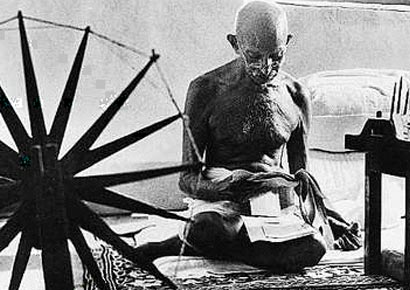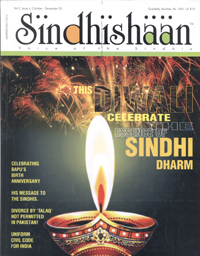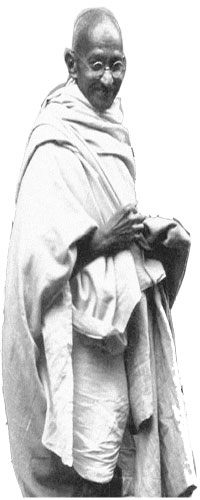Mahatma Gandhi on Sindhis
By Kirat Babani

You have called me here.
You have called me the
greatest man of the world,
but you have forgotten
the first essence of courtesy,
viz. to address me in the
mother tongue.
Today, in the October of 2003, we Indians are the proud and prosperous citizens of a nation, a nation with a rich culture and profound traditions. But only a little over half a century ago, India and the Indians were under the British Rule. It was the great soul Mahatma Gandhi who Single mindedly fought the foreign rule and made the British quit India. Forcibly and on our own terms, with a swadeshi tool of Satyagraha. A totally Indigenous tool, not less that any nuclear weapon, but so peaceful, so rooted in the Indian ethos of non-violence, Ahimsa. And the man behind all this was Mohandas Karamchand Gandhi or Bapu as he was lovingly referred to by all Indians – the man of the millennium, the father of the nation. This 2nd October, India celebrates his Birth Anniversary.
Mahatma Gandhi had a special relationship with Sindh and Sindhis. Many prominent Sindhis were part of his Satyagraha and Swadeshi movements. He loved the Sindhi language and on many occasions had expressed desire to learn the Sindhi language. During the freedom movement of the 20’s and 30’s, he visited Sindhi almost seven times and addressed Sindhi gatherings of students, political workers and so on. He loved Guru Nanak, whom he quoted very often and was influenced by Sindhi Sufi views.
Right though the struggle for freedom, Sindhis supported Mahatma Gandhi with all their might. After the partition, Gandhi felt sad at the plight of Sindhi refugees migrating to India. It was Gandhi who was instrumental in securing an alternative homeland for Sindhis in India. And the then Sindhi leaders lovingly named their new homeland “Gandhidham”, after their Bapu’s name. Such was the deep bond ‘Gandhi and the Sindhis shared among each other. Today, the city of Gandhidham is a flourishing Sindhi settlement which is a Sindh in Hind for Sindhis and Gandhidham stands as a testimony to the fact that Mahatma Gandhi and the Sindhi community shared a common purpose and direction for life.
Sindhishaan pays tribute to the great soul of India by reproducing Bapu’s speech to D. J. Sindh College students and his diary jottings on Sindhis.
Speech at D. J. Sindh College to the students on 5th February 1929.
Sisters and Brothers,
I thank you for your giving me the address and the purse, which you have collected for the Lalaji Memorial Fund. Whatever you have given me will go to the Fund and nothing shall be left with me. You have said in your address many things in praise of me. There is, however, an English proverb which I want to remind you of. It says, “Imitation is the sincerest form of flattery”. If I praise anybody, I must act according to what he says. But I see that you have gone precisely the other way about. You have, as it were, praised me to the skies, but have done nothing according to my wishes. I am not profited by this, nor are you. What have you done? You have presented me with an address written in English. You have appreciatively mentioned in it all my activities, but it is now clear that you have failed to understand me.
I wish that all the students, inclined to serve India, must work in some way. They must try to speak in their own language. Perhaps, you thought that if you gave me an address in Sindhi, I would not be able to understand it. But then you could have supplied me with a Hindi translation of it and I would have appreciated your patriotic sentiment and felt thankful to you for it. I would have then said, ‘Well, whatever else the Sindhis may or may not have done, at least they have followed one of my precepts, by giving me an address in Sindhi. Not that I want to do away with English altogether. English will, no doubt, have its place in India under Swaraj as medium for international commerce. But that does not mean that it should be allowed to usurp the place of your mother tongue. Even when foreigners come to see me, they at least try to speak as many Hindi or other non-English words as they might be knowing in my presence and end their conversation with a Vandematram or a Salaam.
You have called me here. You have called me the greatest man of the world, but you have forgotten the first essence of courtesy, viz., to address me in the mother tongue. Or was it that you wanted only to pull my leg, raising me to the frozen Himalayan heights of mahatmaship and absolving yourselves form the duty of following me in practice? Do not think, because I am smiling, that I am happy at heart. Really speaking I am weeping in my heart. My heart is bleeding to see you dressed in foreign [cloth]. This is very strange to me. The Nehru Report has recommended that Hindustani should be the lingua franca and official language of India under Swaraj. But, perhaps, you will turn round and say, ‘Oh, these are old ideas, suiting old fossils; we are not going to follow them. We are Independencewalas.’
How dare you refuse to put on homespun khadi prepared by the pure hands of your sisters? You have garlanded me with a Khaddar garland, how dare you then yourselves put on collars of foreign textures! If you must put on collars why can’t you put on the khaddar collars prepared by Vithaldas Kerajani? These foreign fripperies are not decorations, they are your fetters since they result in an annual drain of 69 crores of rupees of India every year and help to keep her in bondage. That is why I am crying from the housetops. Boys and girls, look to the money that you are wasting over fripperies, remember your fellow-beings who are starving and dying.

But let me remind you that you have been weighed and found wanting in my test. There is another thing which I want to tell you. During the floods in 1927 Prof. Narayandas Malkani had written to me about the trouble here. He thought it necessary to import some Gujarati volunteers here. Is it not a shame that you should require Gujarati swayamsevaks to come here and serve you? At the most you might accept financial help from outside, but is it not a humiliation that you must ask Gujarat to help you with men also? In spite of all your professors’ teaching, in spite of all your knowledge, you are not ready to help yourselves?
Then there is a third thing even more important. I am told that as soon as marriage is proposed to a Sindhi young man he wants to be sent to England at the expense of his prospective father-in-law and that even after marriage, misses no opportunity of exacting money from the bride’s father. You think yourselves very clever. You get a good lot of money and try to become barristers of I.C.S. Now what is the meaning of all this? You thereby tyrannize over your own women, over your wives. Wife in our language has been described as ardhangini or the better half of man. But you have reduced her to the position of mere chattel to be bought and sold. There is a word in Hindi – ardhangavayu. Can anybody tell me a proper English word for ardhangavayu?
A voice from the gallery : Paralysis.
Yes, paralysis is the exact word for it. This shows that you know Hindi very well and a vote of censure should be passed for Mr. Lulla’s having presented to me the address in English. Well, I was going to say that it is the suppression of the better half of society by you menfolk that is responsible for the state of paralysis in which we find our society today. You read your Milton, your Browning, and your Whittier, all right. Is this what you have learnt from them to reduce your wives who should be the queens of your hearts and your homes into londis? Shame, shame on you! Tell me that you will starve but you will never make your women your slaves. Promise me that deti-leti shall be wiped off. Swear that you will cherish the freedom of your women, as much as your own, that you will die to restore to them their full status and dignity. Otherwise, remember the whole world will shower its contempt on you.
The other day Prof. Narayandas Malkani wired to me that he got his daughter married with only a sari for dowry. He wanted me to send my blessings to the couple. But I hesitated as a Sindhi friend to whom I mentioned the thing told me that it was impossible for a man to get his daughter married in Sindh with that much dowry. That shows what sort of reputation you have established for yourselves. Promise me that you will die rather that be party to the humiliation of your womenfolk by allowing the custom of deti-leti to prevail. Then I will understand that you are ready for the freedom of your country. If I had a girl under my charge, I would rather keep her maiden all her life than give her in marriage to one who demanded even a pie as a condition for marrying her.
Remember these four things then : use your mother tongue, wear only homespun cloth, free your women folk from social disabilities, and do something to help our poor. Finally, let me warn you that if you do not act up to my advice after all your professions of regard for me, you will be called bhats or bards! You must give addresses even to the foreigners in your own language.

Diary jottings on Sindh impressions on 21st Feb, 1929 which was published in Young India of that date.
Sindhi Impressions :
As it is, everything in India attracts me. It has everything that a human being with the highest possible aspirations can want, but when I first visited Sindh in 1916, it attracted me in a special way and a bond was established between the Sindhis and me that has proved capable of bearing severe strains. I have been able to deliver to the Sindhis bitter truths without being misunderstood. I did not mince matters anywhere during the last extensive but hurried tour in Sindh. The audience took my remarks in good part and where it was possible, they gave immediate effect to my advice. The warning to the Karachi students against presenting addresses in English and filling them with empty (empty because of lack of action behind it) praise had instantaneous effect. The numerous other addresses that followed were much more subdued and were read in easy, simple and graceful Sindhi or in equally easy and graceful Hindi instead of being in high-flown and bombastic English which 90 percent of the audience could never follow. Perfection was almost reached at the students’ meeting in Hyderabad. The address was first composed in Sindhi and a good translation in Hindi was supplied to me. I must deal with this separately next week. The only defect was that although it purported to come from the students they knew nothing of the contents. There is too much of laxity observable among us about such simple matters. Surely addresses presented on behalf of institutions must be duly approved by them before they are presented.
Khadi
As in Travancore so in Sindh there is unlimited scope for khadi propaganda for the simple reason that the women of Sindh young and old, do not go in for coloured saris with picturesque borders. They wear white scarves without borders. If men of Sindh will but do a little national propaganda among the womenfolk, they should have no difficulty in inducing them to take to khadi. But the painful fact is that with a few honourable exceptions they are not interested in khadi. They will not part with their foreign clothing. The terrible poverty of the people which they do not see fails to move them. Hence Sindh is perhaps one of the most backward province in point of Khadi.
Of production there is next to nothing. Acharya Kripalani who now better deserves the title of khadi hawker than of Acharya is emphatically of opinion that there is great scope for khadi production in Sindh as he thinks that is spite of the prosperous appearance of the Amils and the Bhaibands there is much poverty in Sindh. He quotes in proof of his statement that the pie is still current coin in Sindh. I can bear testimony to the fact that apart from Orissa, I have never found so many pies in my collections as in Sindh. In one collection of about ten rupees from among over a hundred men, forty pies were counted. This phenomenon cannot be explained away by saying that the people were stingy or unwilling to give. Stinginess I have never experienced in Sindh A people who gave over Rs. 70000 in twelve days could not be considered unwilling. And the fact that they had pies to give shows that a pie can fetch something in the Sindh villages not even far away from the railway. In one place I found even cowries among the collections. Upon inquiry I found that a pice was equal to five cowries. At the same time, I am free to confess that this khadi hawker’s evidence must be taken with a certain amount of reserve because of the fact that for years together he has lived in self-imposed exile. But this is certain that no serious, sustained, methodical effort backed by expert knowledge has been made to test the capacity of Sindh for khadi production. Add to this the fact that Sindh is a cotton-producing tract and has compulsory primary education as in Hyderabad. If there was khadi atmosphere, sacrificial khadi could always be produced through the numerous schools of Sindh. A methodical daily manufacture of yarn under proper inspection in the schools if not even in the colleges should yield good and durable cheap khadi in large quantities. But want of faith is the father of an innumerable brood of doubt.
Reference from : Gandhiji on Sindh and the Sindhis, compiled and introduced by Dr. Motilal Jotwani, Sindhi Academy, Delhi.



